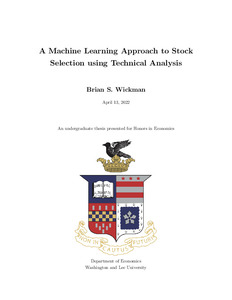A Machine Learning Approach to Stock Selection using Technical Analysis (thesis)

View/
Author
Wickman, Brian S.
Subject
Washington and Lee University -- Honors in Economics
Stock price forecasting
Machine learning
Algorithms
Economics
Metadata
Show full item recordDescription
Thesis; [FULL-TEXT FREELY AVAILABLE ONLINE] Brian S. Wickman is a member of the Class of 2022 of Washington and Lee University. This thesis introduces a novel machine learning framework for stock selection that only uses technical indicators and chart patterns as inputs. In contrast to other papers, the machine learning model first employs a recursive feature elimination algorithm to carefully select model inputs before a support vector machine predicts the direction of the following trading day's price movement. I then evaluate the accuracy of the model's predictions and compare the economic returns of the machine learning algorithm's trading strategy to a buy-and-hold approach and a simple MACD trading strategy on 48 stocks from 2010 through 2019. The 48 stocks selected for the study represent three different types of stocks: there are 30 large-cap U.S. stocks, 10 small-cap U.S. stocks, and 9 European stocks. I find that the machine learning model generated a higher economic return than the buy-and-hold approach for 10 of the 48 stocks. All ten of these stocks were large-cap stocks which suggests that the machine learning model performs best with large-cap stocks over this time period. All in all, this paper supports the adaptive market hypothesis and provides evidence that machine learning algorithms and technical analysis could not be used to consistently generate returns in excess of the buy-and-hold in the low-volatility market conditions of the 2010s.